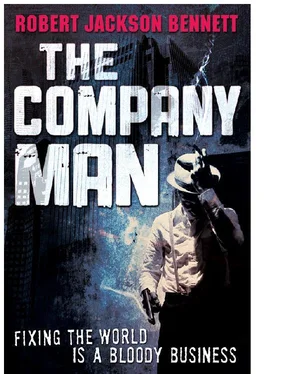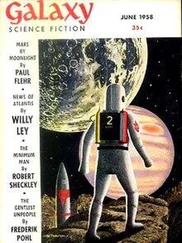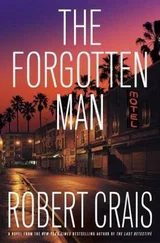Robert Bennett - The Company Man
Здесь есть возможность читать онлайн «Robert Bennett - The Company Man» весь текст электронной книги совершенно бесплатно (целиком полную версию без сокращений). В некоторых случаях можно слушать аудио, скачать через торрент в формате fb2 и присутствует краткое содержание. Жанр: Триллер, на английском языке. Описание произведения, (предисловие) а так же отзывы посетителей доступны на портале библиотеки ЛибКат.
- Название:The Company Man
- Автор:
- Жанр:
- Год:неизвестен
- ISBN:нет данных
- Рейтинг книги:3 / 5. Голосов: 1
-
Избранное:Добавить в избранное
- Отзывы:
-
Ваша оценка:
- 60
- 1
- 2
- 3
- 4
- 5
The Company Man: краткое содержание, описание и аннотация
Предлагаем к чтению аннотацию, описание, краткое содержание или предисловие (зависит от того, что написал сам автор книги «The Company Man»). Если вы не нашли необходимую информацию о книге — напишите в комментариях, мы постараемся отыскать её.
The Company Man — читать онлайн бесплатно полную книгу (весь текст) целиком
Ниже представлен текст книги, разбитый по страницам. Система сохранения места последней прочитанной страницы, позволяет с удобством читать онлайн бесплатно книгу «The Company Man», без необходимости каждый раз заново искать на чём Вы остановились. Поставьте закладку, и сможете в любой момент перейти на страницу, на которой закончили чтение.
Интервал:
Закладка:
“Oh,” she said. She blinked and sat up. “I… I suppose I didn’t really think about it.”
“This could fuck a whole lot of stuff up.”
She sighed and put down her glass. “It could, couldn’t it.”
“Yeah.”
They were quiet for a long while, their drinks untouched. Then Garvey said, “It’s snowing.”
They rose and went to the balcony. Small white flakes were spinning down through the air to the street. It looked nothing like the show at the club. Currents formed between the buildings and they could see where the air turned into waves and horns and spheres and slants. As if the atmosphere itself were made of clockwork, telling time or some glyphic truth to only those who would look up and watch. Or perhaps the message was meant for something else. To something external. Invisible and waiting.
“Look,” said Samantha, and pointed up to the tops of the buildings. They could just make out the conduits sitting on the edge of the building crowns, fat and black and round, like strange rooftop fruit. Steam poured out of the cracks in their housing in thin strings that whipped wildly in the flurries.
“They say they glow blue when a storm comes near,” said Samantha.
“I’ve heard that. It’s not true.”
“No?”
“No. But if it’s a really bad storm they will dance and wriggle. And get fucking hot.”
They watched as a small airship trundled down out of the sky and made a slow pass of the rooftops. A spotlight stabbed down and illuminated the conduits for a moment before blinking out. The little ship had to fight the wind and they watched as it nosed along the rooftops, furiously trying to make its way, like a beetle caught in the ocean tide.
“Checking the conduits,” he said. “This must be the first part of a pretty bad one, then.”
“It must be.”
“I suppose I should go.”
“I suppose so.”
He moved away and said, “I had fun tonight.”
“I did, too.”
“Can I see you again?”
She looked at him. “I thought it wasn’t smart.”
He shrugged. His face was painfully motionless.
“I suppose it couldn’t hurt, could it,” she said.
“No,” he said. They went to the front door and she let him out and he bade her goodbye and went back down to his car. She watched from the balcony as he crossed the street. He stopped before the car door, as though struck by a thought, and she wished he would look up at her. But he did not, and climbed into his car, and drove away.
CHAPTER SEVENTEEN
The small storm lessened as the dawn came, and with the last few flakes Hayes rode the elevator up to Samantha’s office. He had expected some smart remark or a chilly silence when he arrived, but instead he found her patiently waiting for him with a sketch of the dead man and, more impressively, the last known address of Peggy Kennedy, the girlfriend of Naylor that McClintock had rhapsodized over.
“She’s the most likely connection to the man in the canal, if there is one,” she explained. “She was romantically involved with Frank Naylor, who seemed to be the de facto leader of their little group, and she was practically one of the boys. She saw everyone and spoke to everyone. In a social setting, of course. I doubt if she was involved in anything more unsavory than grousing about the company from time to time. And she’s apparently a very pretty girl,” Samantha said. She sniffed. “She was very… popular.”
“Very good. But how are you ahead of me?” he asked as she stood.
“Never mind that,” she said irritably. “Do you want to go or don’t you?”
“Well. Sure?”
They took a trolley down to the edge of the Shanties and then caught a cab the rest of the way in to Peggy’s apartment. The people there told them Peggy had moved out weeks ago and was now staying with a Turkish jewelry salesman, rumored to be a ferocious loan shark. They found the man’s shop not far away. It was run-down and full of cheap baubles and the stench of soggy tobacco. Peggy was tending the counter, and Hayes sent Samantha out while he pretended to browse.
He found Peggy was indeed a very pretty thing, and she knew it, flashing her eyes at him as she tried to pitch him some cheap paste jewelry. She was far less willing to help with the missing man, so Hayes presented himself as an affiliate of a well-known religious charity, the Saint Catherine’s Foundation for Deprived Children. Concerned about the man’s child, he told her smoothly. The boy had been by their establishments several nights in a row and had left a fake name, Hayes said. For some reason the boy had listed Mr. Naylor as a contact, but he was not to be found and they were redirected to her. They had managed to get a rough sketch of the father, and presumably the boy would be with him.
Peggy looked at the sketch of the dead man sadly. “What was he deprived of?”
“Sorry?” said Hayes.
“You’re the… the Foundation for Deprived Children?”
“Oh. Oh, yes. Deprived of social and maternal figures. That’s why most of them come. For the community. For the friends.”
“I see.”
“Did you or Mr. Naylor know the boy or his father?”
“Frank’s dead,” she told him.
“I’m sorry?” said Hayes.
“Frank’s dead,” she said again, then realized his confusion. “Oh, no. No, no, no, not the boy or the father. Frank. Frank Naylor. You know the papers? That thing in the paper?”
“Yes?” He affected surprise. “Oh, my goodness, you mean…”
She nodded but did not say anything or take her eyes off the sketch. “The father’s name was John. John Skiller. The boy’s name is Jack. I remember that.”
He asked her if she knew the boy’s address. She told him that once when Frank was roaring drunk they had swung by a tenement where Skiller lived. Skiller had been livid to see Frank so wild and coming into his home in the middle of the night with his boy there. Tossed them out cold. The place wasn’t much to speak of anyways, she said, and certainly didn’t warrant such pride. She gave him the directions and he thanked her and left.
Samantha was down the street having a cup of thin coffee. He grinned at her and said, “We have a name. A name and an address. Garvey will be delighted, don’t you think?”
“Yes,” she said simply, and stood up and made to go.
“You all right?” he asked.
“Yes.”
“You sure?”
She nodded but said no more. They went back out on the street and headed off to the address.
Skiller. Mr. John Skiller, thought Hayes as they walked. Strangely dead long before his friends. His death was no less grisly than theirs, but perhaps the same man or woman who had killed him had also killed everyone in the Bridgedale trolley. But how or why was beyond him.
Garvey had once said that most crimes were never solved by the why. Ask a cop why someone killed another person and he’ll probably tell you that he doesn’t give a damn, and he’ll mean it. And he’ll be right. You don’t find them by the why, because anyone can kill any person for any reason. One of the defects of the species. But another defect of the species is good old-fashioned stupidity, and that means you can almost always catch them by the how. How they went in, what they used to kill with, how they got it and where it went, and who they talked to and what they did afterward. You can almost always catch them by that. This is a finite world of a limited amount of matter, Garvey would always say, and on their way to and from a murder they probably fucked up plenty of shit.
Hayes tended to agree. But he found it to be a very boring way of looking at the world. Garvey was forever inspecting every little item and every line of dialogue, trying to arrange the murder in his mind. Hayes found people more interesting, and especially getting them to tell him what he wanted to know. Investigation was as much a con game as it was a science. You lied and wheedled and smiled until finally people found themselves giving you the truth bit by bit, against every ounce of their better judgment.
Читать дальшеИнтервал:
Закладка:
Похожие книги на «The Company Man»
Представляем Вашему вниманию похожие книги на «The Company Man» списком для выбора. Мы отобрали схожую по названию и смыслу литературу в надежде предоставить читателям больше вариантов отыскать новые, интересные, ещё непрочитанные произведения.
Обсуждение, отзывы о книге «The Company Man» и просто собственные мнения читателей. Оставьте ваши комментарии, напишите, что Вы думаете о произведении, его смысле или главных героях. Укажите что конкретно понравилось, а что нет, и почему Вы так считаете.












